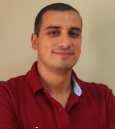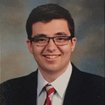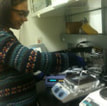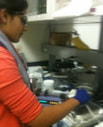Principal Investigator

Saniya LeBlanc
Associate Professor of Engineering and Applied Science
Department of Mechanical & Aerospace Engineering
The George Washington University
202.994.8436
[email protected]
Foggy Bottom campus: Virginia Science & Technology campus:
800 22nd St. NW 20101 Academic Way
Suite 3000 Suite 223
Washington, DC 20052 Ashburn, VA 20147
Saniya LeBlanc's research goals are to utilize nano- and micro-structuring techniques to improve energy systems. She uses scalable manufacturing techniques to create nanostructured materials for energy and thermal management applications and creates techno-economic models for emerging energy technologies. Dr. LeBlanc obtained a PhD in mechanical engineering with a minor in materials science at Stanford University. She earned her BS with highest honors from Georgia Institute of Technology and a Master's of Philosophy in Engineering from Cambridge University as a Churchill Scholar. Dr. LeBlanc has received fellowships from the National Science Foundation, Sandia National Labs, and Stanford's Diversifying Academia, Recruiting Excellence program. With a strong commitment to educational equity, she served in Teach For America as a high school math and physics teacher in Washington, D.C., and she was co-founder of the American Society for Engineering Education's Stanford chapter. Dr. LeBlanc joined GWU from Alphabet Energy, a San Francisco Bay Area startup company, where she created research, development, and manufacturing characterization solutions for thermoelectric technologies and evaluated the potential of new power generation materials.
Associate Professor of Engineering and Applied Science
Department of Mechanical & Aerospace Engineering
The George Washington University
202.994.8436
[email protected]
Foggy Bottom campus: Virginia Science & Technology campus:
800 22nd St. NW 20101 Academic Way
Suite 3000 Suite 223
Washington, DC 20052 Ashburn, VA 20147
Saniya LeBlanc's research goals are to utilize nano- and micro-structuring techniques to improve energy systems. She uses scalable manufacturing techniques to create nanostructured materials for energy and thermal management applications and creates techno-economic models for emerging energy technologies. Dr. LeBlanc obtained a PhD in mechanical engineering with a minor in materials science at Stanford University. She earned her BS with highest honors from Georgia Institute of Technology and a Master's of Philosophy in Engineering from Cambridge University as a Churchill Scholar. Dr. LeBlanc has received fellowships from the National Science Foundation, Sandia National Labs, and Stanford's Diversifying Academia, Recruiting Excellence program. With a strong commitment to educational equity, she served in Teach For America as a high school math and physics teacher in Washington, D.C., and she was co-founder of the American Society for Engineering Education's Stanford chapter. Dr. LeBlanc joined GWU from Alphabet Energy, a San Francisco Bay Area startup company, where she created research, development, and manufacturing characterization solutions for thermoelectric technologies and evaluated the potential of new power generation materials.
Postdoctoral Researchers
Graduate Students

Benedict Vergara received his B.S. and M.S. in Electrical Engineering at The George Washington University, both with Concentrations in Energy and Power Systems. Ben worked at the engineering consulting firm Strategic Analysis, Inc. as a staff engineer aiding the development of techno-economic analyses for clean energy technologies. Ben is currently a Ph.D. candidate in Electrical Engineering modeling urban district energy systems to study the tradeoffs between cost, performance, and sustainability.

Bengisu Sisik holds a B.S. in Mechanical Engineering from Bilkent University, Turkey, and a M.S. in Mechanical and Aerospace Engineering from The George Washington University. Her current research focus in the LeBlanc lab for her Ph.D. at The George Washington University is on the "process-microstructure relationship in thermoelectric materials produced through laser powder bed fusion", aligning with her research interests in additive manufacturing, thermoelectric generators, and energy systems modeling.

Leticia Oiwa is pursuing her M.S. in Mechanical Engineering with a focus on Material Science. She graduated from The George Washington University in 2023 with a B.S. in Mechanical Engineering. Some of her research interests include material science, renewable energy, additive manufacturing, and energy systems. She is currently working on additive manufacturing of thermoelectric materials via laser powder bed fusion.

Mandy Long is pursuing an M.S. in Mechanical Engineering with a Concentration in Fluids, Energy, and Thermal Sciences. She graduated with a B.S. in Mechanical Engineering with a Concentration in Aerospace Engineering from The George Washington University in 2023. Her research interests include energy system modeling, techno-economic analysis, and sustainability of agricultural systems to address food insecurity. She is currently evaluating the incorporation of heat pumps into residential buildings.

Monica Romero earned her B.S. in Chemistry at the University of New Mexico with an emphasis in materials science and inorganic chemistry. She is currently pursuing her Ph.D. in Mechanical and Aerospace Engineering within the LeBlanc lab at The George Washington University. Her research focuses on additive manufacturing of thermoelectrics to evaluate device efficiencies for large-scale, multimaterial systems.

Sumner Gubisch is a Ph.D. student at The George Washington University, with dual degrees from The University of Massachusetts Amherst (B.S. in Physics, B.S. in Astronomy). He is currently conducting experimental and computational research on the derivation of the process-structure-property relationships of additively manufactured (laser powder bed fusion and material extrusion) semiconducting thermoelectric materials. He is interested in multifunctional materials, integrating triply periodic minimal surfaces as a support structure thermoelectrics.

Tyler Wyka is pursuing an M.S. in Mechanical Engineering. He graduated with a B.S. in Mechanical Engineering from The George Washington University in 2024. His research interests are in thermofluids, complexity, and system modelling. He hopes to use these topics to advance an equitable sustainable energy transition.
Undergraduate Students

Adam Newman is pursuing a B.S. in Mechanical Engineering with a Concentration in Robotics and expects to graduate in 2027. His research interests center around material science and control systems. Adam is determined to use his skills to fight against climate change and environmental pollution

Eliot Hunter is pursuing his B.S. in Mechanical Engineering. His academic research interests center around the application of distributed energy resources through microgrid systems. This coincides with personal research interests regarding hydrogen as an energy source through fuel cell technology.

Jairo Sanchez is currently pursuing his B.S. in Mechanical Engineering and expects to graduate in 2025. He is currently working on the analysis of the impacts that different thermoelectric leg geometries have on thermoelectric performance

Shelby Pullen is pursuing her B.S. in Mechanical Engineering with a Concentration in Aerospace and a Minor in Mathematics. She expects to graduate in 2025. She is currently working on the GW Consortium on Naval Enterprise Pathways (CoNEP) project and has previously worked on a project for HSEMA where she modelled the electrical load for DC.
Former Members
Former Postdoctoral Researchers

Dr. Cagri Oztan received his Ph.D. in Mechanical Engineering from the University of Miami. He joined the LeBlanc Lab in 2021 as postdoctoral researcher where he is currently investigating the process-structure-property relationships of laser additive manufactured thermoelectric materials and high entropy alloys.

Dr. Vijay Ponnambalam (Ponns) is a postdoctoral Scientist. Materials synthesis is his passion, particularly in thermoelectrics, which demand to combine glass-like heat transport with electrical transports of crystalline materials. The challenge here is processing and he is always motivated to synthesize materials with cutting-edge properties by processing.

Dr. Haidong Zhang received his Ph.D. from the University of Florida. After working as a postdoctoral researcher at the Carnegie Institution of Washington, he joined the LeBlanc Lab in 2017 and worked on novel, laser-based manufacturing and characterization of thermoelectric materials.

Dr. Ahmed El Desouky received his Ph.D. from the University of California San Diego (Joint with San Diego State University) in May 2012. Following his Ph.D., Dr. El Desouky was a postdoctoral researcher at San Diego State University's Advanced Materials Processing Laboratory where he worked on combustion synthesis of alloys. From 2012-4, he was an assistant professor of materials science and engineering at Egypt Japan University of Science and Technology. Dr. El Desouky joined the LeBlanc Lab in March 2014; his research was focused on novel processing and manufacturing techniques of nano-structured materials. He now works at Eaton as an Aerospace Additive Manufacturing Specialist.

Dr. Stephanie H. Johnson received her Ph.D. in Materials Science and Engineering from Drexel University in June 2013. Dr. Johnson's doctoral research focused on the influence of size, shape, and interfacial coupling on the physical properties of single-component and core-shell multi-component nanostructures. Upon completion of her Ph.D., Dr. Johnson worked for Croda, Inc. investigating the applications and scalable production of nanomaterials. Dr. Johnson joined the LeBlanc Lab as a Visiting Scholar in 2014; her work investigates how material properties can be maintained in large scale, cost effective manufacturing methods.
Former Lab Students

Ryan Welch completed his Ph.D. in Mechanical Engineering in 2024 from The George Washington University. He researched laser additive manufacturing of the high temperature thermoelectric material, silicon germanium. He completed his M.S. in Mechanical Engineering from The George Washington University in 2020 and was a DoD SMART Scholar. Ryan interned for NSWC Dahlgren where he performed modeling and simulation for high-temperature composite materials. He is interested in exploring additive manufacturing to engineer material structures from the nano- to macro-scale in order to achieve unique functionality.

Michael Orrill completed his Ph.D. in the LeBlanc Lab in 2019. He works at NextFlex.

Duncan Frazier received an M.S. in Mechanical Engineering with a focus in Aerospace in the spring of 2024. He joined the LeBlanc lab in the fall of 2023 and worked with the Oak Ridge National Laboratory's Manufacturing Demonstration Facility on a localized shielding system for arc-welding additive manufacturing. This system proved sensitive metals could be protected in this process without the use of an inert gas enclosure.

Jonathan Garcia received his M.S. in Mechanical and Aerospace Engineering in 2023 from The George Washington University. He received his B.S. in Mechanical Engineering from The George Washington University as well. During his time as a master's student, he conducted research on additive manufacturing of hypersonic thermal protection composites and published a master's thesis on the subject. He currently works as a fan section composite design and structures engineer at Pratt and Whitney for their geared turbofan commercial engine program.

Rachel Gray received her M.S. in Mechanical Engineering from GWU in 2023. During her time in the LeBlanc Lab, she worked on integration of renewable energy and storage into district energy systems.

Naomia Suggs-Brigety pursued a Ph.D. conducting research on energy equity and how to integrate it into energy systems. She graduated from Jackson State University, an HBCU in Mississippi, with a B.S. in Civil Engineering. After working for the Mississippi Department of Transportation, she shifted into policy working in the U.S. House of Representative on U.S. – Africa relations, global health and international development. Naomia also has a M.A. from the Elliott School of International Affairs in International Development Studies specializing in Sustainable Urbanization.

Michael Carter is currently pursuing a Ph.D. at Columbia University. He received a M.S. in Mechanical Engineering from The George Washington University and a B.S. in Mechanical Engineering from the University of Maryland. Michael worked as a Junior Mechanical Engineer for Computer Sciences Corporation where his work focused on the design of mechanical systems for U.S. naval vessels. Michael also worked as a Clean Energy Fellow at Technology Transition Corporation where he supported the Hydrogen Education Foundation's Hydrogen Student Design Contest. His research interests are in energy production, nanomaterials and scalable production of nanomaterials and nanomaterial based devices.

Tripp Griffith received his B.S. in Mechanical Engineering from GW in 2020. He was a student in the 5 Year Masters program for Mechanical Engineering with a Concentration in Fluid Mechanics, Thermal Sciences, and Energy. Tripp worked at Baumann Consulting, an engineering consulting firm focused on building commissioning and auditing. To go along with his work on district energy systems in the LeBlanc Lab, he was also engaged in the University's Thermal Fluids Lab.

Nicholas Batista pursued his M.S. in Mechanical and Aerospace Engineering at The George Washington University. His current academic and research endeavors focus on Fluid Mechanics, Thermal Sciences, and Energy. Nicholas graduated with a B.S. in Mechanical Engineering from GWU in 2013. During his undergraduate studies, he performed computational nano-materials science research while also gaining manufacturing work experience.

Maryam Zahedi received a M.S. in Mechanical Engineering from Florida International University in July 2013. From 2005-10, she worked on clean industry innovations in cement industries. She received her B.S. in Mechanical Engineering from Shahid Chamran Unversity in February 2005. Her research interests are in heat transfer systems and nano -structured materials.

Adam Read is a mechanical engineer in the Electric Boat division at General Dynamics in New London, CT. He obtained his M.S. from The George Washington University's Department of Mechanical and Aerospace Engineering in 2015. He received his B.S. in Chemical Engineering from Brigham Young University. Before joining GWU, he worked as a process engineer for Rio Tinto where he worked on mineral flotation and water treatment technologies. His research interests are in mechanical systems, manufacturing processes, and plant design.

Jim Tronolone majored in Biomedical Engineering at The George Washington University. His research was focused on colorimetric sensor fabrication using biological materials in ink-jet printing. His research interests lie in the applications of nanobiotechnology, including the engineering of biomolecules and the design of bio-inspired systems. He received the NSF Graduate Research Fellowship and pursued a PhD at Texas A&M.

Joseph Crandall double majored in Computer Science and Physics, both of which he earned in 2017. He attended graduate school in GW's Electrical and Computer Engineering department.

Mattie Watson graduated with a B.S. in Mechanical Engineering from The George Washington University. She researched the properties of bismuth telluride to be used in selective laser melting.

Scott Barnes pursued his B.S. in Mechanical Engineering with a Concentration in Robotics at The George Washington University. He investigated the spreadability and flowability of powders used in selective laser melting. His research interests include automated manufacturing techniques and processes, such as additive manufacturing and collaborative robotics.

Trevor Olson graduated with a B.S. in Electrical Engineering from The George Washington University. He worked on a research project focusing on the production of photovoltaic cells using nanofabrication techniques.

Lindsay Ryan graduated with a B.S. in Systems Engineering and Computer Science at George Washington University. She researched manufacturing and production costs of thermoelectric generators in the LeBlanc Lab. She attended graduate school in Germany.

Ellise Damschroder graduated with a B.S. in Mechanical Engineering with a Concentration in Aerospace from The George Washington University. She went on to pursue her M.S. at Stanford University.

Melina Minhas graduated from Loudoun County High School in June 2014. She worked on a thermoelectric manufacturing cost project in Summer 2014.

Tai'Lon Jackson graduated from Frank W. Ballou Senior High School in June 2014. He worked on a research project focused on novel processing and manufacturing techniques of nano-structured materials.

Jena Barnes completed an undergraduate research project on synthesis and thermoelectric characterization of zinc oxide nanowire films. She earned her B.S. in Materials Science and Engineering from Stanford University and went on to pursue a Ph.D. at Duke University on a graduate research fellowship.

Bridgette LaFaye graduated from Woodrow Wilson High School in June 2014. She went on to pursue her B.S. Materials Science and Engineering at the University of Illinois at Urbana-Champaign. She worked on a research project on the costs of thermoelectrics and manufacturing in Summer 2015.

Maneeshika Madduri completed an undergraduate research project on thermal characterization of zinc oxide nanowire films using the 3-omega technique. She earned her B.S. in Electrical Engineering from Stanford University. Maneeshika worked on a solar technologies project in Nepal on a Fulbright fellowship then went to work at Sandia National Labs.